Comparaison Iphone 7 Plus Et 8
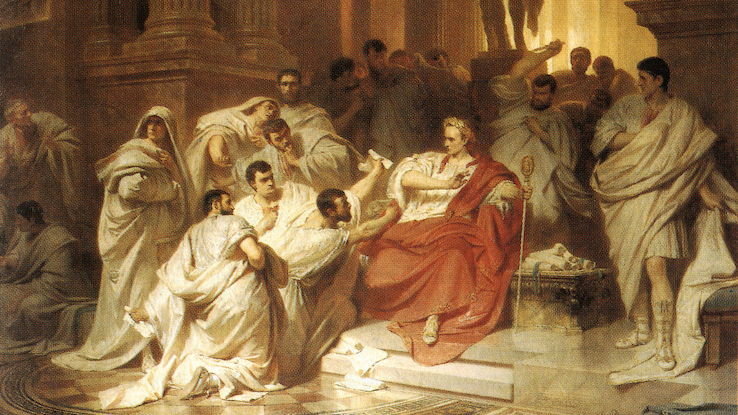
You might already know the tragic tale of Caesar, the famed Roman leader who was murdered past his friends and foes in the Senate — but exercise you lot know the story behind his downfall? Caesar's legacy is complicated, but his story has inspired novels, plays, films, television shows and other cultural retellings worldwide. Still, the actual narrative of Caesar's death — peculiarly the motivations and the backwash — is often shaded beneath the circumstances of the murder. To mark the Ides of March, the date of Caesar's bump-off, we're taking a look into what led the Roman elite to impale Caesar and how the aftermath resulted in the autumn of the Roman Republic.
How Caesar Reshaped Rome (for Better and Worse)
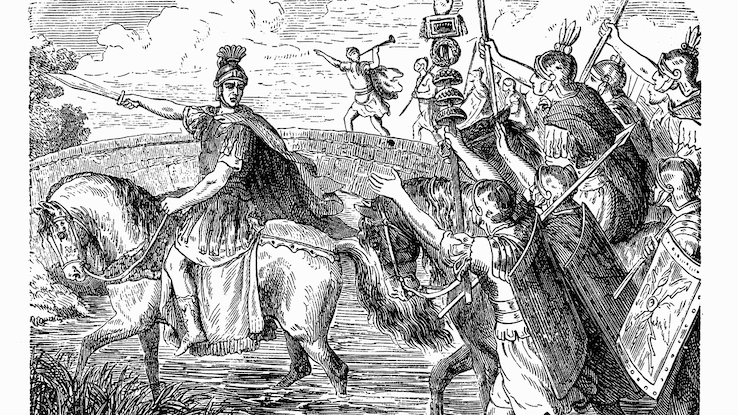
Caesar is one of the virtually significant figures in Roman history, and for skillful reason. Throughout his life, he involved himself in the affairs of his people and state. Through charisma, wit and brute strength, Caesar made his manner to the top of the ranks in the Roman military, gaining fame for his conquest of the Gallic people and his epic rivalry with the fallen Roman leader Pompey.
Following his military service, Caesar progressed quickly through the political chain. It didn't take long for his wartime reputation to lend itself to an fifty-fifty more favorable political career. Between 69 B.C. and 59 B.C., he transitioned from a low-level quaestor, a type of public officer, to a consul, the highest-level official in Roman politics. At the peak of his life — and non long earlier his death — he was the most powerful man in the Roman Republic.
On the surface, Caesar didn't seem to burn any bridges with the Roman public. As a politician, he spearheaded efforts to aggrandize Rome, including ordering the reconstruction of Carthage and Corinth, two notable ancient cities destroyed in previous wars. He as well worked to improve the lives of working class Romans, providing supplies, land, and debt and hire forgiveness and working to remedy the financial gap betwixt the classes. For these efforts, Caesar was honey among Rome'south working-class citizens.
Nevertheless, Caesar's image suffered from a lack of clarity effectually his intentions. Did he actually care about Rome, or only his own ascension? To his fellow elites, it seemed that he had begun to steer Rome beyond a republic and into a organisation of imperialism. In the end, he seemed intent on taking his identify at the top of the government. And this didn't sit down well with the Roman Senate.
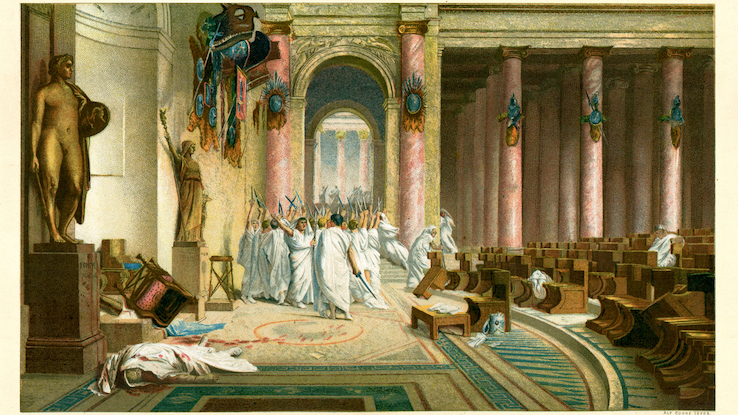
The motivations for Caesar's murder aren't entirely straightforward. Caesar'south infamous function in Roman expansion meant that he had a complicated relationship with the people of his government, some of whom looked upon him with adoration and others who felt angered by his perceived grabs for power. Yet, he was probable killed for one primary reason: fear of dictatorship. Caesar's upwards ascension to ability didn't seem to have an endpoint. Politicians around him began to grow nervous that he might usurp their power and take over all of Rome. The former rulers of Rome, the Etruscan kings, had been power-hungry tyrants. Memories of their rule led to the distrust effectually Caesar's empowerment.
In 44 B.C., two Roman politicians named Cassius Longinus and Marcus Brutus (one of Caesar'due south closest friends) discussed ways to prevent Caesar from seizing power over the land. Worried that Caesar would button them into a tyrannical government, the two began to expand their circle of concern to include other politicians, Senators and nobles. Presently, many of Caesar'southward colleagues were in on the plot to end Caesar's impending reign. But how? Cassius and his conspirators saw the murder of Caesar every bit the only clear way to liberate themselves and the country from his imperialist ambitions.
How Did the Murder of Caesar Unfold?
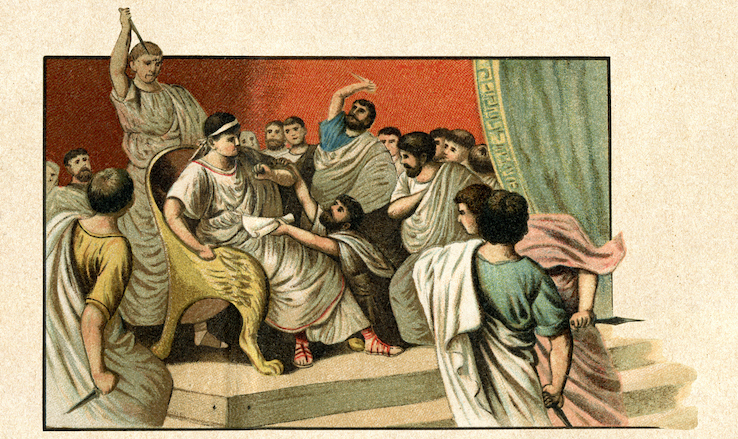
Unfortunately for Caesar, he was an easy target for bump-off. He yearned to atomic number 82 a semi-normal life and did not use bodyguards. The Senators intended to kill him on the Ides of March — March 15 in 44 B.C. — by drawing Caesar to the location of the Gladiator Games, the Theatre of Pompey, and stabbing him.
When Caesar didn't prove up to the fake event, they sent Brutus to retrieve him. Brutus had become Caesar's long-time confidant afterwards Caesar pardoned him post-obit a battle. He had become like Caesar'southward ain kid, which meant that he had lilliputian problem persuading Caesar to follow him. Caesar brought Mark Antony, a shut ally, forth. The assassinators lured Antony away and left Caesar with no cover. One time he was lone, someone grabbed Caesar's toga, fellow Senators drew their blades and the assail began.
The assault lasted simply minutes, merely Caesar ended up with nearly thirty wounds. He bled out and passed abroad on the theater flooring. Historians speculate that his heartbreaking concluding words were "Et tu, Brute?" — pregnant "You too, Brutus?" — conveying the shock Caesar felt that, even after pardoning Brutus, the man would participate in Caesar's trigger-happy assassination. All the same, Brutus, along with the residue of the Senators, felt justified in the assail, believing information technology would foreclose the Roman government from falling victim to tyranny. But how did the remainder of Rome feel when they institute out about the bump-off?
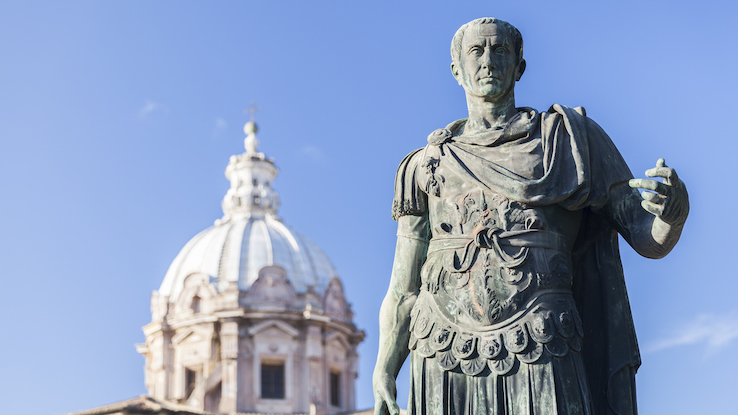
Caesar's decease was not a finalizing event. Subsequently Caesar was killed, the Senators sent Brutus to speak to the citizens and explain their intentions behind the murder. Brutus met with the Roman public and conveyed that, had they non killed Caesar, he may accept taken over as King of Rome and threatened their liberties and rights.
While this seemed perfectly reasonable to the Roman aristocracy, the common people of Rome were not satisfied with the reasoning. His murder echoed throughout the state, and the centre- and lower-class people of Rome were furious that the Senate had taken their leader's life. The assassination too led to a series of ceremonious wars. The lower classes rose up confronting the aristocracy, with Marker Antony and his allies rallying against Cassius and Brutus' armies in Greece.
Meanwhile, Caesar'due south heir, an adopted grand-nephew named Octavian, found out near the death of Caesar while training at a armed forces camp. He came to Rome to inherit Caesar's fortune and establish himself swept into the unfolding battles for power and wealth that resulted in additional years of conflict. The wars betwixt Cassius, Brutus, Antony and Octavian led to an ongoing loss of life and contributed to public unrest throughout an increasingly less manageable state.
Ultimately, information technology took some other 17 years earlier the Roman Republic ended and the Roman Empire developed. Octavian, renaming himself "Caesar Augustus," took his identify every bit the beginning Roman Emperor, spurring a new political horizon for Rome.
Comparaison Iphone 7 Plus Et 8,
Source: https://www.reference.com/history/julius-caesar-downfall-ides?utm_content=params%3Ao%3D740005%26ad%3DdirN%26qo%3DserpIndex&ueid=bf695308-06a0-4758-831b-bd739f029640
Posted by: yeagerwincert1949.blogspot.com


0 Response to "Comparaison Iphone 7 Plus Et 8"
Post a Comment